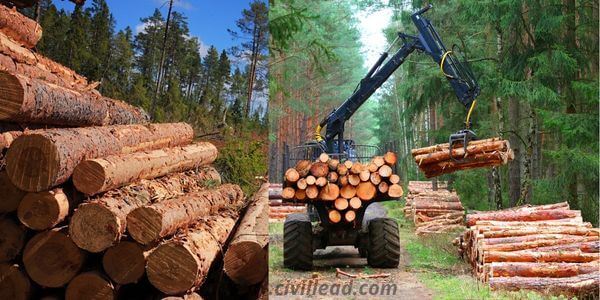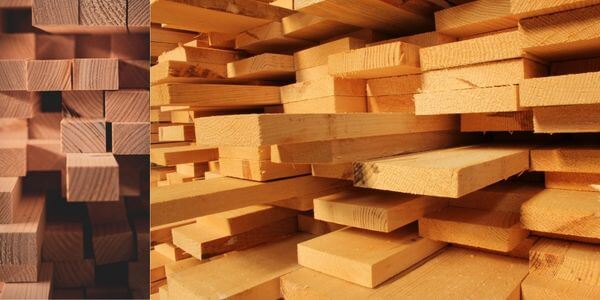Table of Contents
Difference Between Wood And Timber
The equivalence of the terms “timber” and “wood” is frequently misunderstood.
Wood refers to the substance that helps make up a tree. It is the tough, fibrous structural tissue in the tree’s trunk and roots.
Timber refers to wood at any stage after a tree has felled. It contains both the raw material, called rough timber and the processed material.
Today’s article will explain the difference between wood and timber.
What is Wood?
Wood is a natural material composed of fibres, lignin, cellulose and hemicellulose. It is also permeable, or porous, with stringy organic tissues.
Wood’s prime purpose is to hold up the tree, allowing it to grow linear and tall adequately to grip sunlight for photosynthesis. Wood also allows water and nutrients to grow tissues and leaves.

Wood is primarily used in construction work, but it is also used in everyday products such as toothpicks, pencils, sticks, tables, chairs, and so on.
What is Timber?
The term “timber” comes from the English term “timebrain.” Timber is defined as wood that is suitable for construction, cosignatory, or other engineering objects.
Now a day timber is used for beams, columns, piles, rooting, bridges, doors, trusses, windows etc.
It is applied to trees measuring not less than 0.6 meters in girth or circumference of the trunk of a tree. Standing timber is the timber included in a living tree.
The timber found after falling a tree is known as rough timber. The timber sawn and cut into suitable commercial size is known as converted timber.
Timber is classified into two types: hardwood and softwood. However, many different types of wood are covered by this category.

- Bamboo
- Birch
- Cedar
- Cherry
- Cross-laminated
- Fir
- Glulam
- Green timber
- Lime
- Mahogany
- Oak
- Pine
- Plywood
- Sapele wood
- Spruce
- Tulipwood
- Walnut
- Wood ash
Difference Between Wood And Timber
| S.No. | Wood | Timber |
|---|---|---|
| 1 | The substance that forms the tree and transports nutrients and water refers to as “wood.” | When a tree falls or is crushed, one form of wood is used, known as timber. |
| 2 | Wood could be sticks, pencils, twigs, toothpicks and chips. | Timber refers to larger wooden substances or even firewood. |
| 3 | The term “wood” is also used to describe other plant substances that are biologically identical to “rigid, fibrous structural tissue.” | Timber can refer to any position in the forest after a tree has been felled. |
| 4 | Wood is a rubbery or fibrous substance made of firs or other plants. | Timber is a refined and transformed wood used to make beams, rafters, and boards. |
| 5 | The term “wood” is usually used to describe a matter or material in its natural or native state. | It applies to it after man has transformed or modified it. |
| 6 | Wood is just the name of the material. | All timber is made of wood. |
| 7 | Wood is classified into three types: engineered wood, hardwood, and softwood. | Timber is classified into two types: Softwood and hardwood |
| 8 | The term “wood” refers to trees and, more specifically, the substance used to make trees. | Timber refers to a period in a tree’s life after it has been cut down, including crushed trees used in construction and architecture, cellulose fibres or pulpwood used in paper manufacturing, and so on. |
| 9 | Wood is a dense forest or wooded area used as a building material to make different items, such as fuel, etc. | Timber is a heavy, stiff beam, a log obtained by separating and used to provide a stronghold for something, such as a roof. |
| 10 | Wood should be wrapped around or placed with trees. | Timber should be set with timbers |
| It is raw wood of any size. | It is finished wood of sufficient size. | |
| 12 | It is untreated wood. | It is treated wood. |
| 13 | It is used for fencing, artificial gardening, musical instrument, sports instruments, hand tools, household use, home decor, fuel etc. | Timber is used in the construction of buildings in a number of places, including floors, doors, windows, poles, beams, trusses, rafters, staircases, columns and piles etc. |
Characteristics of Good Timber
- Durability
- Free From Defects
- Elasticity
- Hardness
- Permeability
- Strength
- Structure
- Toughness
- Weight
- Workability
Also, Read – Requirements of Good Quality Timbers
Best Woods For Furniture
- Deodar
- Jack fruit
- Mulberry Wood
- Oak
- Rosewood
- Sal wood
- Satin Wood
- Sissoo Wood
- Teak-wood
- Walnut
What is Lumber?
Lumber, also called timber, is wood prepared into beams and planks as part of the wood production process.

Mainly Lumber is used in construction framing and finishing (window frames, floors, wall panels). Lumber has many applications outside of home construction.
Lumber is any harvested wood that has been cut into heavy timbers or components for light-frame construction and logs.
Lumber can be classified as either hardwood or softwood. The term is frequently used to refer to the products made from logs in a sawmill.
Final Words
The main component of a tree or shrub’s trunk or branches is wood, a solid fibrous material used to make paper furniture, fuel, and other things.
While timber is processed for use in engineering construction work. A wooden beam or board is utilised in the construction of a home, ship, or other structure.
The common factor is that both can derive meaning from a tree product. However, these are not the only interpretation.
Also, Read
Seasoning of Timber – Purpose, Advantages And Method
Veneer vs Laminate – 19 Difference Between Veneer and Laminate
Particle Board vs MDF – 15 Difference Between MDF and Particle Board
What is WPC Board? Advantages, Disadvantages & Uses
What is ACP (Aluminium composite panel)? – Definition, Advantages, Disadvantages